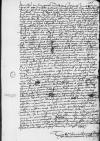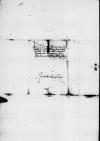Letter #728
Mark LAURIJN to Ioannes DANTISCUSBruges, 1531-12-17
English register:
Laurijn thanks Dantiscus for his many gifts. He has distributed among his friends the copies of the Victoria Serenissimi Poloniae regis which Dantiscus had sent with an earlier letter, and conveyed Dantiscus’ greetings to them. With another letter that De Schepper’s wife Elisabeth Donche gave to him, he received more copies and, to his great pleasure, a portrait of Dantiscus as well.
In his letter Dantiscus congratulated Laurijn for his safe return from France, where he himself had had an unpleasant experience some 24 years ago, and he advised Laurijn to remain on the side of the Emperor [Charles V], as he had done since that time. Now Laurijn can understand why Dantiscus does not know more French. He extensively refers to years of French attempts to induce him into disloyalty to the Emperor. Although the French used all possible means to persuade him to choose their side, he has always remained faithful to the Emperor. He describes this metaphorically as a heroic combat from which he has emerged victorious.
He expresses his gratitude to Dantiscus and offers him his services. He conveys greetings from Antoon van Schoonhoven, Frans Cosijn and Dantiscus' other Brugge acquaintances.
Manuscript sources:
Auxiliary sources:
Prints:
| ||||||||||||||
Text & apparatus & commentary Plain text Text & commentary Text & apparatus Excerpts concerning Dantiscus' travels
Reverendissimo in Christo Patri ac Domino, domino
In aula caesaris adscribed, in the hand of other⌈In aula
Humillime me Tuae gratiae commendo, Praesul dignissime, cuius Reverendissimae Paternitati gratias ago immensas, quod tantis munusculis me dignata sit donare.
Accepi priores tuas cf.
Praeter haec mihi congratularis plurimum, quod sospes ex
Optime verum gratias, quas primis verbis egi maximas, repetere cogor, qui omnia fecisti, quibus ... illegible⌈...... illegible⌉ declarares singularem quendam et peculiarem erga me nullo meo merito favorem, affectum et amorem. Donas, congratularis, consulis, non possum reddere vices, desunt vires. Hoc solum possum me totum praebere tibi quo, uti poteris tuo arbitratu: iube, impera, manda. In manibus tuis sunt opera mea, quae semper habebis tuo nutu paratissima.
Vale, Patrone observandissime, quem salutari a me petierunt domini
Iterum vale.
Tuae Reverendissimae Paternitati obsequentissimus clientulus,


 Bcz 243, p. 156
Bcz 243, p. 156